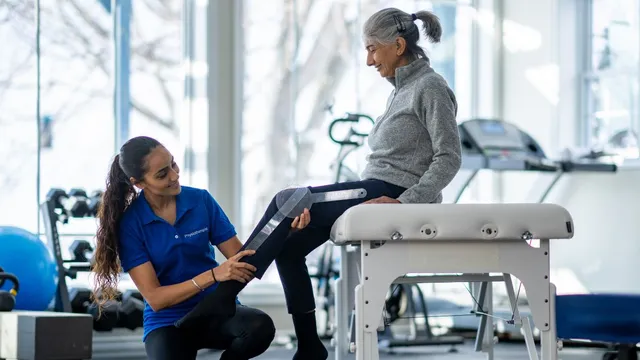- By Priyanka Munshi
- Sat, 07 Sep 2024 06:17 PM (IST)
- Source:JND
World Physiotherapy Day 2024: Frequent physical therapy is essential for addressing and managing issues related to everyday living, providing a proactive approach to maintaining general health. In today’s fast-paced world, many of us deal with chronic ailments caused by prolonged sitting, poor posture, repetitive movements, back pain, joint stiffness, and muscle strain. Physical therapy helps to improve strength, flexibility, and mobility by offering customized exercises and treatments designed to target specific problem areas.
By incorporating physical therapy into your routine, you can prevent minor aches from developing into more serious conditions. It also enhances your body’s functionality, reducing pain and making daily tasks easier. A professional therapist can help you live a more active and pain-free life by improving your posture, lowering your risk of injury, and enhancing overall physical performance through regular sessions.
In a conversation with Jagran English, Dr. Rahul Kuril, a physiotherapist at AIMS Hospital in Dombivli, discussed the role of physical therapy in addressing daily lifestyle issues. According to Dr. Rahul, physiotherapy is essential for helping patients regain health and mobility. It plays a pivotal role in addressing lifestyle-related issues by enhancing physical well-being, preventing injuries, and managing chronic conditions, thereby improving one’s quality of life.
Also Read: How Diet Affects Cognitive Function In Older Adults? Expert Explains
Physiotherapy aims to restore a patient’s mobility, function, and well-being after illnesses such as arthritis, back and spine problems, stroke, or injury. It not only helps in managing injuries and degenerative conditions of the muscles and joints but is also crucial in the management of neurological conditions like stroke and Parkinson’s, as well as cardiac conditions such as bypass surgeries and valve replacement. Physiotherapy is increasingly important in managing today’s lifestyle-related issues like obesity, diabetes, high blood pressure, reduced endurance, and overall well-being.
It is also important to note that a majority of people affected by back and neck pain have poor posture and ergonomics. Physiotherapy helps immensely by strengthening postural muscles, improving joint and muscle flexibility, and modifying activities to better suit your body type. Additionally, physiotherapy has been shown to improve mental agility in the elderly, thereby preventing falls and reducing stress and anxiety.
How Physiotherapists Help You:
According to Dr. Rahul, before initiating any exercise routine, a physiotherapist will review your medical history to understand any chronic health problems, assess limitations, and set goals accordingly. The physiotherapist will then develop a tailor-made treatment plan based on the patient’s needs. The exercise regimen will include stretching, strength training, balance exercises, and cardiovascular workouts, all adjusted to the patient’s capacity.
It is important to avoid overexertion and to perform exercises slowly and gradually, increasing the frequency and duration over time. Consistency is key; it’s better to exercise daily than to skip routines. Maintaining proper form and posture is crucial to avoiding injuries while exercising. Follow the instructions given by your physiotherapist to achieve the best results and strengthen your muscles and joints. Avoid doing exercises on your own, rest when needed, and ensure you keep up with your physiotherapy appointments.
Also Read: Celiac Disease And Pregnancy: Everything You Need To Know From An Expert
Finally, Dr. Rahul noted that physiotherapy addresses muscular, neurological, and cardiovascular imbalances and fosters optimal health. Physiotherapists empower individuals to prevent injuries before they occur. Engaging in physical movement through customized exercises helps release endorphins, reducing anxiety and depression, enabling you to perform daily activities without difficulty.

